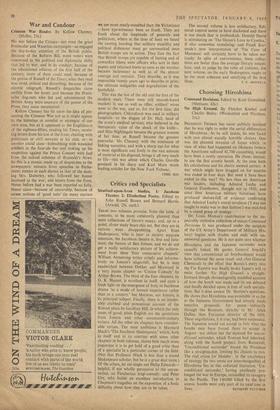War and Candour • •
Crimean War Reader. By Kellow Chesriey. (Muller, 25s.)
No war before the Crimea—not even the great Peninsular and Waterloo campaigns—so engaged the day-to-day attention of the British public. Because of the Reform Bill, more voters were concerned in the political and diplomatic shifts that led to war, and in its conduct; because of the educational reforms of the first half of the century, more of them could read; because of the genius of Russell of the 7'imes, what they read was vivid, critical and disturbing; because of the electric telegraph, Russell's despatches came swiftly from the front; and because the Penin- sular dug-outs who led and administered the British Army were unaware of the power of the Press, they came uncensored.
Kellow Chesney has hit upon the idea of pre- senting the Crimean War not as it might appear to the historian or novelist or strategist of our own time, but as it appeared to the Englishman of the eighteen-fifties, reading his Times, receiv- ing letters from his son at the front, chatting with politicians or civil servants at his club, or—in another social class—hobnobbing with wounded soldiers in the four-ale bar and stoking up his suspicions against the Prince Consort with fuel from the radical columns of Reynolds's News. So this is a mosaic made up of despatches to the newspapers; extracts from speeches in Parlia- ment; entries in such diaries as that of the dash- ing Mrs. Daherley, who followed her hussar husband to the war; and letters from the front. Never before had a war been reported so fully. Never since—because of censorship, because of newer notions of 'good taste' (in many matters
we are more mealy-mouthed than the Victorians) —have eye-witnesses been so frank. They are frank about the ineptitude of generals and politicians, where at the time of Suez we heard the canting humbug that military stupidity and political dishonour must go unremarked once British troops are in action. They face the fact that British troops ;re capable of looting and of cowardice (there were officers who sent in their papers and returned home as soon as the weather became inclement) as well as of the utmost courage and restraint. They describe, as it was impossible twenty years ago to describe in print, the ultimate indignities and degradations of the battlefield.
This was the last of the old and the first of the modern wars. There were still smooth-bored muskets in use as well as rifles; soldiers' wives went to the war, and so, for the first time, did photographers. Chloroform was used in military hospitals—to the disgust of Dr. Hall, head of the army's medical services, who believed in the therapeutic value of the shock of the knife— and Miss Nightingale became the greatest woman of her time, as Russell became the greatest journalist. Mr. Chesney, with the minimum of linking narrative, and with a sharp eye for what is most significant and lively in the vast amount of material at his disposal, brings it all very much to life—this war about which Charles Greville gossiped in his diary and Karl Marx wrote leading articles for the New York Tribune.
CYRIL RAY










































 Previous page
Previous page